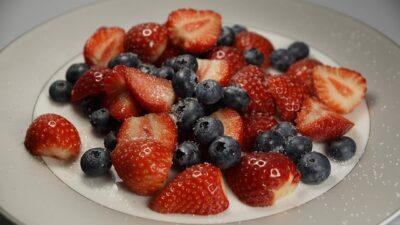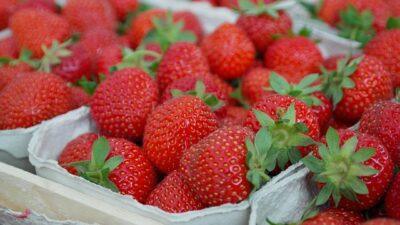Alzheimer’s has destroyed the lives of many, bringing pain and heartache to their families. The quest for a cure is ongoing, and positive results are slow-coming, but a recent study points to a surprising and all-natural way to combat it.
The study showed that a compound called fisetin, found in small quantities in strawberries and several other fruits and vegetables, may help combat memory loss and learning deficits, two debilitating Alzheimer’s symptoms.
The Salk Institute for Biological Studies published the report which states, “a daily dose of the antioxidant fisetin keeps mice—even those with genetic mutations linked to Alzheimer’s—from experiencing memory and learning deficits as they age.”
Salk Institute scientists, led by researcher Pamela Maher, took mice, some with genes linked to Alzheimer’s, and a control group of normal mice. Some of the mice with Alzheimer’s-related genes were fed fisetin beginning when they were three-months old. The two control groups, one of normal mice and one of mice with Alzheimer’s-related genes, were given no supplements. Water mazes were then used to test the mices’ memory and learning abilities as they aged.
New All-Natural Capsule Protects You From Dangerous Toxins And Pollutants!
“By nine months of age, mice that hadn’t received fisetin began performing more poorly in the mazes,” the report said. “Mice that had gotten a daily dose of the compound, however, performed as well as normal mice, at both nine months and a year old.”
How fisetin works
Further testing was done by Maher’s team, and they noticed that in mice with Alzheimer’s-related genes, cellular inflammation pathways were turned on. However, in the mice that were given fisetin, those pathways were hampered and anti-inflammatory molecules were present. While results in test-tubes and in animal studies (mice) are promising, no research involving fisetin’s effects on humans has been undertaken as of yet.
What is fisetin
Fisetin is a plant flavonoid and can be found in small amounts in fruits and vegetables like strawberries, mangoes (skin on), cucumbers (skin on), apples, kiwis, peaches, grapes, tomatoes and onions. However, fisetin is found is such small amounts in all of these foods, it is difficult for a person to get the same amount of fisetin daily that was used in the study. Strawberries are one of the best sources, but even with them, 37 strawberries would need to be consumed every day.
If you decide to explore fisetin supplementation on your own, there are a few cautions. While fisetin present in foods is perfectly safe to consume, no research has been conducted concerning toxicity levels of fisetin supplements, and there is a small caution that fisetin might cause cancer at some point since it inhibits two enzymes (toposiomerases 1 and II) that are important for proper DNA replication. Be sure to speak with your health care provider before embarking on a fisetin supplementation program.
Where do we go from here?
As the scientific community continues to search for a cure for debilitating diseases like Alzheimer’s, the best approach is to stay informed, partner with your doctor and continue to seek out healthy eating strategies.
Foods with fisetin compounds present in them are great for numerous other reasons as well. For example:
Strawberries are anti-inflammatory and great for allergy sufferers, as they can help prevent the production of histamines.
Mangos are packed with powerful digestive enzymes, antioxidants and carotenoids. Some studies have shown mangos help prevent cancer as well.
Cucumbers are low-caloric, nutrient-dense vegetables. They also contain a mineral called silica, which helps with collagen production, leading to healthier skin and improved complexion.
Apples help balance cholesterol levels, protect against asthma, support the liver, and have anti-inflammatory and antioxidant properties. They may also help lower the risk of heart disease and type two diabetes. Organically grown apples are best, as pesticides are used heavily in regular apple orchards.
Chia Seeds: Used By Top Survivalists For Mission-Critical Strength And Endurance!
Kiwis are packed with antioxidants and digestive enzymes. They can even help with halitosis and protect against respiratory illnesses.
Peaches help protect immune cells and can serve as a preventative measure for those with failing eyesight, as peaches help prevent macular degeneration. Peaches also contain phytonutrients that can help protect against cancer, along with promoting heart heath and detoxification.
Grapes have antioxidant, antimicrobial and anti-inflammatory properties and are great for those with inflammatory conditions like eczema and arthritis. Those who suffer from allergies, asthma and viral infections may find them helpful as well. Cardiac health, hypertension and cancer prevention are other areas grapes can benefit.
Tomatoes help protect immune cells and are rich in antioxidant and antifungal compounds.
Onions help with detoxification and have antioxidant and anti-inflammatory properties. They also help promote the growth of healthy bacteria in the intestines and contain biotin, a nutrient that helps prevent hair loss from biotin deficiency.
When it comes to combatting the heartbreaking symptoms of Alzheimer’s, solutions aren’t always as forthcoming as we desire. However, fisetin holds promise. Hopefully more studies that explore the human body’s response to fisetin will be conducted in the near future – we we’ll find a cure.
What are some all-natural ways you try to maintain brain health and memory? Share your tips in the section below:
Sign up for Off The Grid News’ weekly email and stay informed about the issues important to you
 Off The Grid News Better Ideas For Off The Grid Living
Off The Grid News Better Ideas For Off The Grid Living






